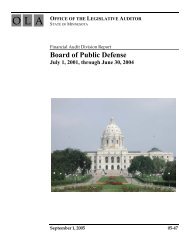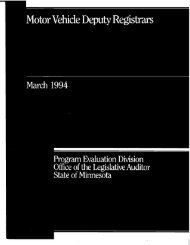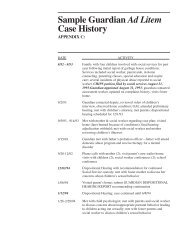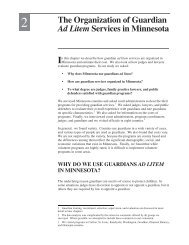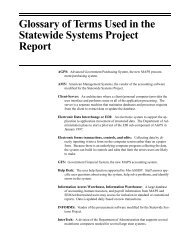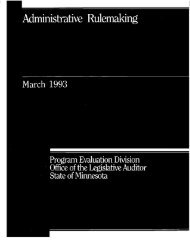Occupational Regulation - Office of the Legislative Auditor
Occupational Regulation - Office of the Legislative Auditor
Occupational Regulation - Office of the Legislative Auditor
Create successful ePaper yourself
Turn your PDF publications into a flip-book with our unique Google optimized e-Paper software.
APPENDIX A 85<br />
WISCONSIN<br />
Wisconsin has a<br />
Department <strong>of</strong><br />
<strong>Regulation</strong> and<br />
Licensing<br />
responsible for<br />
both health and<br />
non-health<br />
occupations.<br />
In Wisconsin occupational regulation is overseen by <strong>the</strong> Department <strong>of</strong> <strong>Regulation</strong><br />
and Licensing, which was created in 1976. The Secretary <strong>of</strong> <strong>the</strong> department is<br />
appointed by <strong>the</strong> Governor. This department handles both health and non-health<br />
occupations. Many <strong>of</strong> <strong>the</strong> pr<strong>of</strong>essions have regulatory boards which maintain<br />
responsibility for policy development and disciplinary actions, but o<strong>the</strong>r<br />
occupations are directly regulated by <strong>the</strong> department. In recent years <strong>the</strong> state has<br />
shifted towards using less restrictive forms <strong>of</strong> regulation. Thus, most<br />
newly-regulated occupations are overseen by <strong>the</strong> department ra<strong>the</strong>r than a board.<br />
The department handles <strong>the</strong> complaint and investigation process, although <strong>the</strong><br />
Attorney General’s <strong>Office</strong> may assist in a very limited number <strong>of</strong> cases.<br />
<strong>Legislative</strong> proposals relating to occupational regulation are heard in various<br />
committees <strong>of</strong> <strong>the</strong> Assembly and Senate. Wisconsin does not have a sunrise<br />
provision, but <strong>the</strong> Department <strong>of</strong> <strong>Regulation</strong> and Licensing does apply sunrise-like<br />
criteria when it studies regulation requests. Frequently <strong>the</strong> Legislature will direct<br />
new groups seeking regulation to <strong>the</strong> department so <strong>the</strong> department can apply <strong>the</strong><br />
sunrise criteria and issue a recommendation commensurate with <strong>the</strong><br />
administration’s political agenda. In addition to studying new regulation requests,<br />
<strong>the</strong> department is responsible for assisting regulatory boards in <strong>the</strong> preparation<br />
and presentation <strong>of</strong> any proposed regulatory changes. In <strong>the</strong>se situations, <strong>the</strong><br />
department will apply <strong>the</strong> sunrise criteria and issue a recommendation about <strong>the</strong><br />
proposed legislation. Occasionally <strong>the</strong> department may oppose <strong>the</strong> boards’<br />
position on legislation or rules. Should <strong>the</strong> Legislature decide to regulate an<br />
occupation or business entity contrary to <strong>the</strong> department’s recommendation, <strong>the</strong><br />
legislature will ask <strong>the</strong> department to work with <strong>the</strong> group to ensure that <strong>the</strong><br />
regulation can be implemented effectively.<br />
SUMMARY<br />
In conclusion, we found that all <strong>of</strong> <strong>the</strong> states that we contacted were struggling<br />
with <strong>the</strong> questions similar to those that gave rise to this report, including: What is<br />
<strong>the</strong> best way to inform legislative decision making concerning occupational<br />
regulation What is <strong>the</strong> most efficient way to organize occupational regulation<br />
How can regulatory entities best address consumer complaints Several people<br />
we talked to in o<strong>the</strong>r states echoed concerns raised in Minnesota about <strong>the</strong> degree<br />
to which occupational regulation actually protects <strong>the</strong> public and <strong>the</strong> relative<br />
political strength <strong>of</strong> pr<strong>of</strong>essional organizations.<br />
In general, states that have formal sunrise provisions, complete with<br />
questionnaires for applicant groups and summary reports generated by ei<strong>the</strong>r<br />
executive branch departments or legislative staff, give <strong>the</strong> impression <strong>of</strong> a<br />
better-informed legislative process. However, even states with such complete<br />
sunrise provisions experience frustrations with pr<strong>of</strong>essional groups that are able to<br />
circumvent <strong>the</strong> process. Generally, states with sunset provisions give <strong>the</strong><br />
impression that <strong>the</strong>y do a better job <strong>of</strong> providing continued legislative oversight.



